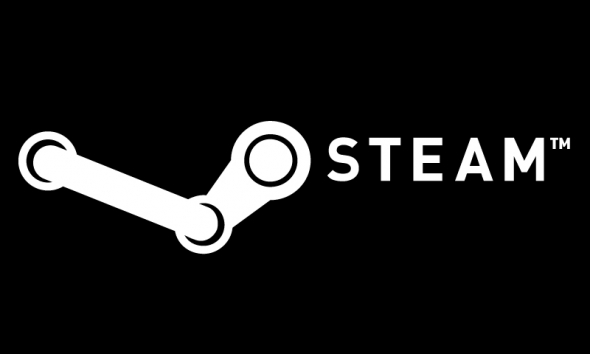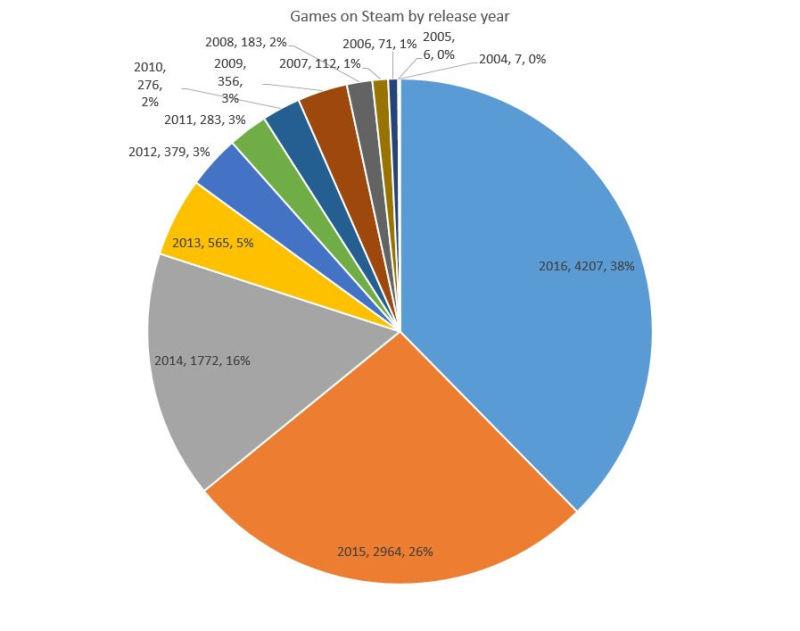
The video game developer and distribution platform-owner Valve has announced that it will no longer moderate game submissions to Steam, and will instead "allow everything", so long as it is not blatantly illegal or "straight up trolling". This comes after literal years of complaints from players about the poor quality of games being submitted on the platform, and years of failed attempts by Valve to shut down or limit such releases. Apparently, they are just giving up.
Valve executive Erik Johnson made this announcement on an official blog post today, in which he defended the change in policy as a matter of protecting free speech rights.
"If you’re a developer of offensive games, this isn’t us siding with you against all the people you’re offending. There will be people throughout the Steam community who hate your games, and hope you fail to find an audience, and there will be people here at Valve who feel exactly the same way. However, offending someone shouldn’t take away your game’s voice. We believe you should be able to express yourself like everyone else, and to find others who want to play your game. But that’s it."
-- Erik Johnson, Valve executive, official blog
I'm a huge proponent of free speech, and a firm opponent of censorship, but I'm not sure if this move from Valve is the right one. For me, this is less an issue of free speech and censorship, and more an issue of quality control. Steam is already inundated with crappy, barely-working games that are phishing for people's money. People have been submitting, and charging consumers for, blatant asset-flips, Unity tutorials, copy-pasted rip-offs and clones, achievement farms, and all sorts of other low-quality, minimum-effort games and "fake games". In essence, Valve is enabling illigitimate developers to sell defective merchandise to the public, and Valve is directly profiting off of those sales. Does this represent a conflict of interest? Is Valve under a perverse incentive to facilitate the sale of as much crap as it possibly can?
That doesn't even include larger indie debacles like Life of Black Tiger, which actually saw a release on PSN as well! It also doesn't include the vast array of Early Access titles that may or may not at some point be released as "complete", fully-functional titles.
Yes, it is nice that indie developers (especially budding young ones) have a platform on which to publish their work. However, the flood of games on the platform is not necessarily good for the consumer. Even if all the games that were submitted to Steam were quality games submitted by honest developers in good faith, the shear volume of games would already make it difficult to weed through to find what you are looking for.

Almost half of all games ever released on Steam were released in a single year.
Source: Steam Spy.
Instead of doing their own moderation or quality-control, Valve apparently intends to release a suite of controls intended to allow end users to filter out content that they don't want to see. Again, according to Erik Johnson:
"Taking this approach allows us to focus less on trying to police what should be on Steam, and more on building those tools to give people control over what kinds of content they see. We already have some tools, but they're too hidden and not nearly comprehensive enough. We are going to enable you to override our recommendation algorithms and hide games containing the topics you're not interested in. So if you don't want to see anime games on your Store, you'll be able to make that choice. If you want more options to control exactly what kinds of games your kids see when they browse the Store, you'll be able to do that. And it's not just players that need better tools either - developers who build controversial content shouldn't have to deal with harassment because their game exists, and we'll be building tools and options to support them too."
-- Erik Johnson, Valve executive, official blog
While it's nice that they intend to give users more control over what we see, I'd still like to see some stricter quality control in the submission process. I doubt that game submissions are going to be properly flagged as being "incomplete", "non-functional", or an "asset flip". Will developers (many of whom are already known to operate in bad faith) accurately self-report potentially offensive content or lack of real effort on their part? Certainly not! And even if they are, will Valve's algorithms properly identify and filter them? Will there be too many games that slip through the filter? Or (perhaps worse yet), too many false positives that hide otherwise desired games from people's criteria?
Johnson says that Valve wants to "build those tools to give people control". So they don't already exist at the time that you're announcing this new policy? Will they exist by the time the policy goes into effect (if the policy of "allow everything" isn't already in effect)? If you cared about doing right by consumers, shouldn't you be giving us those tools, letting us test them in the open market, make sure they work, and then make us rely on them to do all the curation and quality control that you as a retailer and distributor are supposed to be doing? Instead, they're just going to promise us the vague, nebulous idea of us having some control, at some unspecified point in the future.
How does Valve define "trolling"?
In the end, however, I'm most confused by Valve's apparent desire to police games that are deliberately trolling:
"With that principle in mind, we've decided that the right approach is to allow everything onto the Steam Store, except for things that we decide are illegal, or straight up trolling."
-- Erik Johnson, Valve executive, official blog
I guess my biggest question about this new policy is: how is Valve going to define and enforce "trolling"? Doesn't Poe's Law tell us that it's virtually impossible to tell the difference between a person pretending to hold an outrageous belief, and a person who actually does hold that belief? Thus, how do we differentiate between deliberate trolling, and a genuine expression of a person's honest belief -- whether it's artfully expressed or not?
Would making a deliberately offensive game in order to deliberately offend someone be a textbook case of "trolling"? If so, then how does Valve intent to handle that? There's already a growing internet culture revolving around the idea of invading self-proclaimed "safe spaces" in order to deliberately trigger "sensitive snowflakes". That is trolling in its most malicious, unsympathetic form. Video game culture is, after all, well known to be rife with toxic fandom. What are Valve's standards for judging such trolling going to be?
Would games like Hatred or Active Shooter be pulled from the store under these new guidelines? Active Shooter, by the way, was pulled from Steam after a public outcry.
To be honest, I'm not bothered so much by politically sensitive games. I feel that if games want to be taken seriously as an art form, then they need to be more willing and confident to thoughtfully tackle sensitive topics. I actually criticized Call of Duty: WWII for its timid afterthought of its allusions to the Holocaust, and I've criticized Battlefield 1 for being self-aware enough to emphasize the pointlessness of the death and destruction of that war in the game's tutorial, but then still typecasting the Germans (and Ottomans) as the bad guys in a war that didn't really have "good guys" or "bad guys". But there are limits. I would say that an attempt to release a hypothetical "Sim Concentration Camp: Auschwitz" would almost certainly be insensitive and in very bad taste, even if it does somehow manage to be mechanically compelling. Would such a game make it onto the Steam marketplace now?
I'm more worried about a proliferation of the afore-mentioned cash-grabs in the form of lazy asset flips, achievement farms, and the "fake games" that Valve themselves have (in the past) admitted are proliferating on their platform. Will even more of these games get onto Steam now? Or are these the very thing that Valve is talking about when they say "trolling"?
I've been very harsh on some Steam games like Dreadout and Room 404, but I don't think that these games should be removed from the market or never allowed to be released. As bad as they are, they at least (to me) seem to have been made and released in good faith by the developers. I feel they are honest and genuine attempts to make the best game that the developers were capable of making.
That still comes down to a judgement call on my part. That's the point! Even if Valve is only going to moderate games that are "trolling", how is that not going to be a judgement call by someone at Valve?
UPDATE 1st AUGUST, 2018: Steam removes game for installing malicious cryptocurrency miner
Well this didn't take too long, now did it. Less than two months after announcing that it would stop curating games, Steam has now had to pull a game from its storefront. The game was called Abstractism, and was pulled because it was apparently running a cryptocurrency mining malware in the background. Users complained of excessive CPU and GPU usage, and the game was being flagged by malware scanners.
Apparently, the game was released back in March (several months before Steam announced it would stop curating games), so it slipped by with whatever lax curating Valve may or may not have been doing at the time. However, complaints didn't start to pile up until an update was released in July. While Valve did do the right thing by pulling the game (months after its release), this incident just highlights the necessity of some kind of curation or moderation. This game literally installed malware on people's computers!
This sets a very dangerous and frightening precedent. Could future games go further by installing key-loggers that could give the "developers" access to customers' bank accounts or other sensitive personal information? Does Valve have any policy in place to stop such malicious games from being released? Or are they only going to take action after the fact, when the damage has already been done?
Not only that, but this highlights the potential need for someone to curate game updates as well. While Abstractism did receive some complaints prior to the July update, the number of complaints spiked after the update. It is possible that the game may have been [mostly] benign at launch, but the update either added or enabled the cryptocurrency mining process.
The bottom line is that Valve's apparent "hands off" approach is not only lazy and greedy, but it's actually dangerous! Nintendo, Sony and Microsoft curate and moderate everything that goes up on their storefronts (though, admittedly, that doesn't stop garbage from getting through). Those companies also (as I understand) review game updates when they are submitted by the developers. Why can't Valve do those things?
1st AUGUST, 2018: Steam has now had to pull a game for installing a malicious cryptocurrency miner.